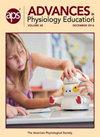评估在线入学前解剖学讲习班对物理治疗博士课程的知识掌握和解剖学能力的益处
IF 1.7
4区 教育学
Q2 EDUCATION, SCIENTIFIC DISCIPLINES
引用次数: 0
摘要
对于健康专业教育工作者和新生来说,如何在有限的时间内为学生过渡到学习要求更高的研究生教育做好准备是一个极具挑战性的过程。预科课程提供了一种解决方案,让学生接触基础科学,为博士课程的严谨学业做好准备。这项回顾性研究评估了新生在第一学期开始前的七月和八月参加为期两天的在线解剖学讲习班是否会提高解剖学知识。该研究还评估了所学知识是否转化为物理治疗博士课程第一学期解剖学成绩的提高,同时还考虑了性别、种族和平均学分绩点等变量。与基线前测验相比,研修班两天所学的知识使解剖学后测验分数有了统计学意义上的显著提高(P < 0.001)。多变量回归分析表明,第一学期解剖学实践得分与参加研讨会之间存在统计学意义上的显著关系(P = 0.04),性别也具有预测价值(P = 0.01)。评估在线解剖讲习班预测价值的时间效应表明,预科讲习班对八月份参加者的第一学期解剖学实践成绩均有统计学意义(实践 1 的 P = 0.03;实践 2 的 P = 0.04),但对七月份参加者的影响不大。本研究的结果支持在线入学前解剖学讲习班的实用性,该讲习班可帮助学生为联合健康博士课程中研究生水平的解剖学学习预期做好准备。本文章由计算机程序翻译,如有差异,请以英文原文为准。
Assessing the benefits of an online prematriculation anatomy workshop on knowledge acquisition and anatomy competency in a Doctor of Physical Therapy program
Preparing students for the transition to graduate-level education with greater learning demands in a condensed time frame is a challenging process for health professions educators and incoming students. Prematriculation programs offer a solution for exposing students to the foundational sciences in preparation for the academic rigor of a doctoral program. This retrospective study assessed whether incoming students enrolled across 3 yr of a 2-day online anatomy workshop, offered in July and August before the start of their first semester resulted in improved anatomy knowledge. Whether this acquired knowledge translated to improved anatomy outcomes in the first semester of a Doctor of Physical Therapy program was also assessed, while also accounting for variables of gender, ethnicity, and grade-point average. Knowledge acquired during both days of the workshop resulted in statistically significant improvements in anatomy postquiz scores compared to the baseline prequiz (P < 0.001). Multivariate regression analyses demonstrated statistically significant relationships between the first-semester anatomy practical score and workshop participation (P = 0.04) as well as a predictive value of gender (P = 0.01). Evaluating a timing effect on the predictive value of the online anatomy workshop demonstrated statistically significant effects of the prematriculation workshop on both first-semester anatomy practicals for August (P = 0.03 for practical 1; P = 0.04 for practical 2) but not July workshop participants. Findings from this study support the utility of an online prematriculation anatomy workshop to prepare students for graduate-level anatomy learning expectations in a doctoral allied health program.
求助全文
通过发布文献求助,成功后即可免费获取论文全文。
去求助
来源期刊
CiteScore
3.40
自引率
19.00%
发文量
100
审稿时长
>12 weeks
期刊介绍:
Advances in Physiology Education promotes and disseminates educational scholarship in order to enhance teaching and learning of physiology, neuroscience and pathophysiology. The journal publishes peer-reviewed descriptions of innovations that improve teaching in the classroom and laboratory, essays on education, and review articles based on our current understanding of physiological mechanisms. Submissions that evaluate new technologies for teaching and research, and educational pedagogy, are especially welcome. The audience for the journal includes educators at all levels: K–12, undergraduate, graduate, and professional programs.

 求助内容:
求助内容: 应助结果提醒方式:
应助结果提醒方式:


